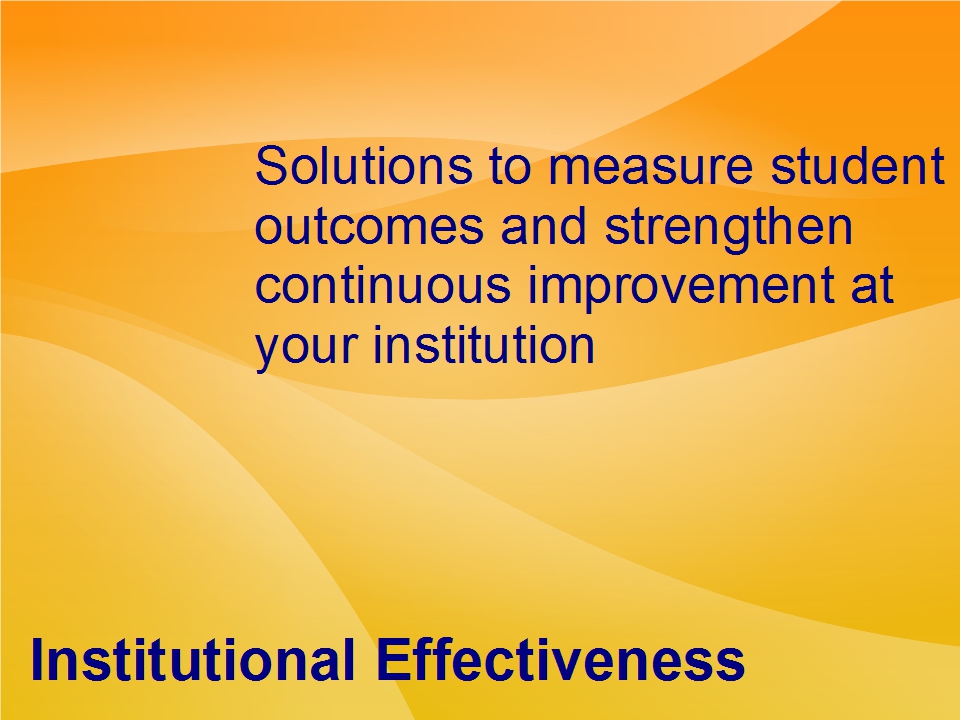A well-devised program of research and assessment fosters an institutional culture committed to continuous improvement in service to the mission of the institution.
Institutional Effectiveness Leadership

Accrediting agencies continue to broaden their expectations for higher education institutions to perform systematic assessments of administrative and student learning outcomes, and then collect evidence that programs use the assessments to improve the entire student experience.
The demands on institutional research and assessment offices have never been greater, often requiring social scientific research expertise and management skills to implement a program of research designed to measure what works in education.
Historia|Research supports the efforts of our clients to enhance the research and assessment capabilities of their institutions. We design our institutional effectiveness solutions to the specifications of key leadership and then work with research and assessment offices to implement and maintain their assessment activities locally.
Institutional Effectiveness Solutions
| Academic Program Review | When responsibilities for academic program review are distributed among chairs, deans, and provosts, the design of the review process is the key mechanism to insure quality assessments of academic programming. We provide academic program review solutions that balance the use of quantitative and qualitative measures, empowering leaders in academic affairs to identify trends and insights to improve and strengthen academic programming. |
| Exploratory Research | Oftentimes, the biggest challenge for continuous improvement in higher education is determining where to begin or focus efforts. Exploratory or applied research enables administrators to define problems more concisely and form heuristic devices to shape the design of interventions to support student success. Our researchers offer qualitative and quantitative research methodologies to discover the underlying factors and information that move initiatives from concept to action. |
| Institutional Assessment Planning | Institutional assessment planning requires formal articulation and feedback loops that align institutional efforts to improve student learning outcomes, administrative efficiencies, employee performance, and budget allocations. Conversely, the absence of a cohesive institutional assessment plan often results in “silo-ed” administrative and academic units unresponsive to executive leadership and strategic planning. Our approach seeks to leverage assessment mechanisms as a comprehensive system to disseminate mission-centric initiatives and strategic plan objectives into the periodic evaluations and operational planning of an institution. |
| Assessment Design | Program and unit assessment is often the domain of the curricular and co-curricular experts, but those experts rarely have formal training or knowledge of student learning or unit assessment design. As a consequence, while assessment activities may be extensive, the annual production of assessment results may not provide data that improve decision-making and close the feedback loop that accreditation agencies expect. We offer services for the design and implementation of assessment instruments and institutional effectiveness measures that give academic leaders the assurance that program and unit directors are engaged in reliable and valid assessment practices. |
| Grant Office Development | A social scientific approach to institutional research, planning, and effectiveness at an institution creates the infrastructure that makes possible participation in the broader social and federal initiatives to expand access to higher education and improve student outcomes, such as the What Works Clearinghouse. We provide grant proposal and evaluation solutions to support institutional leaders who seek to contribute to the growing body of literature on higher education practices that advance student success. |
| Quasi-Experimental Research | In the higher education setting, resources are often limited while new intervention programs to support students are often costly. Consequently, it is not enough to know generally what the “high impact practices” are, but to know specifically how much benefit a particular high impact practice, like learning communities, will have locally. Our experts design ethical, applied research projects to measure the potential size of the benefit that new programs or practices will have on institutional effectiveness measures and net institutional revenue to sustain proposed services. |

Comments are closed, but trackbacks and pingbacks are open.